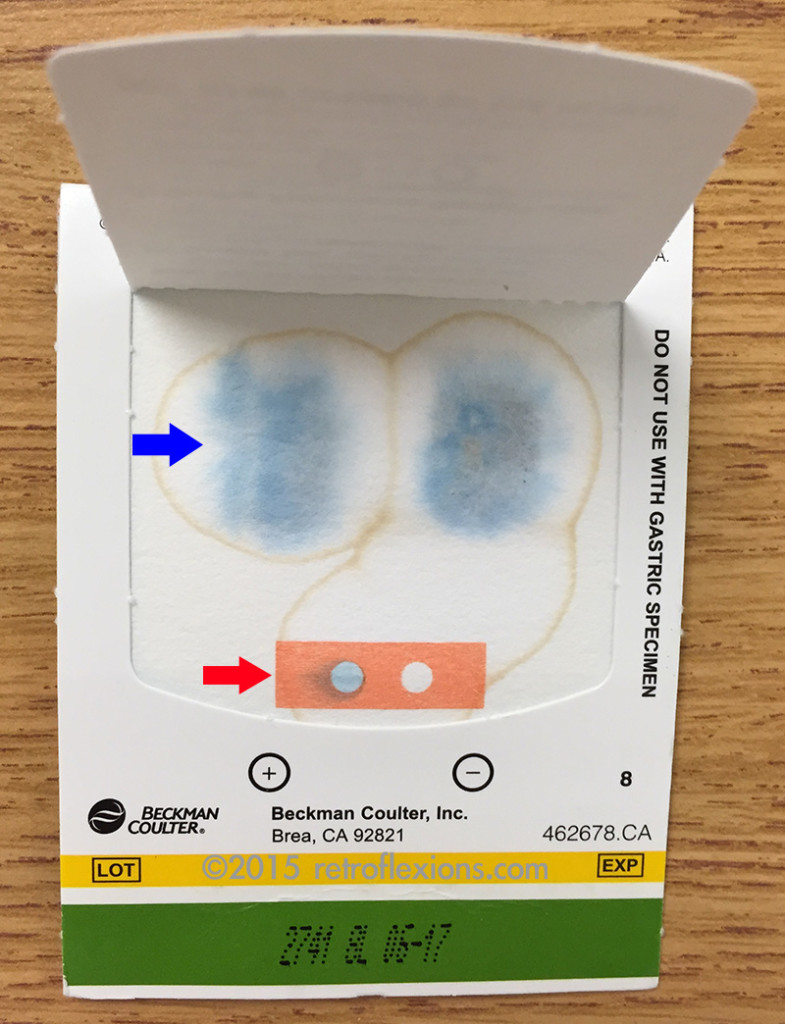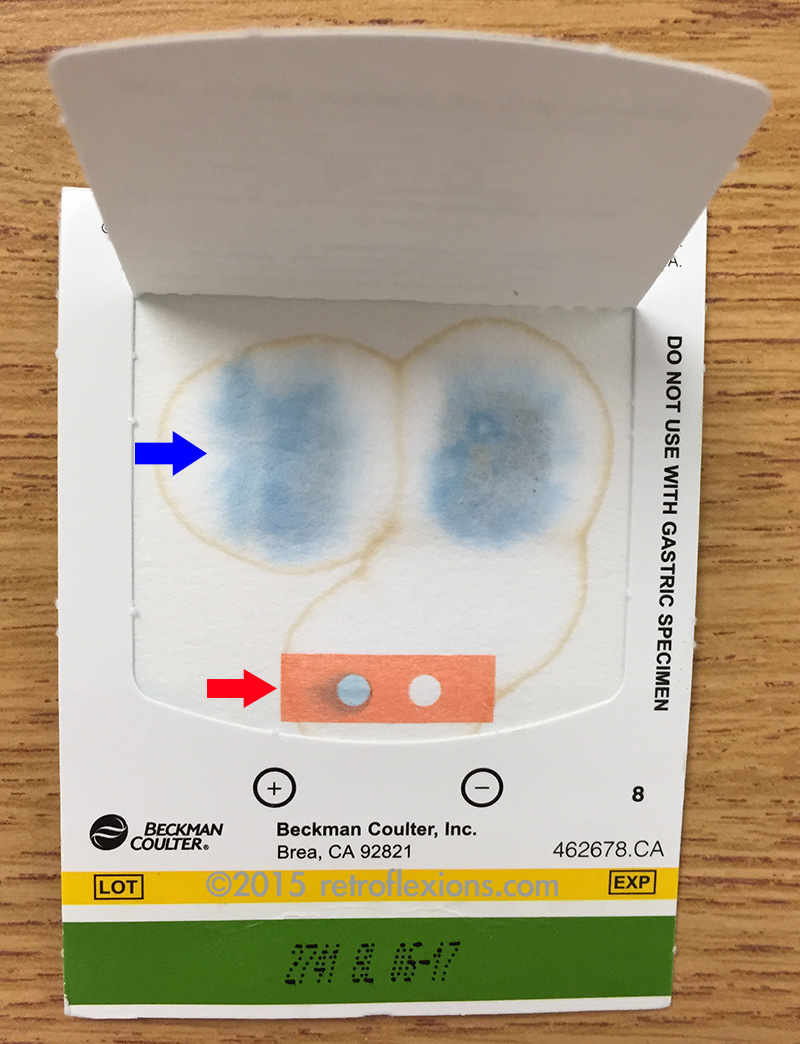Occult gastrointestinal bleeding simply means that there is blood loss into the GI tract that cannot be seen with the naked eye (as opposed to overt GI bleeding, where blood is seen). Typically, patients with occult GI bleeding have slowly progressive anemia due to slow chronic blood loss. There are a variety of causes of occult GI bleeding: some common causes are esophagitis, gastritis, angiodysplasia, large polyps, or cancer anywhere in the GI tract.
The test for occult GI bleeding is called the fecal occult blood test (FOBT) and is also known as the stool guaiac test. It is performed by taking a stool sample and applying a tiny amount to a paper test card. A developing agent is then used on the card and if blood is present in the sample the reaction produces a blue color. The test is specific enough that a positive test is usually positive because of the presence of blood in the stool.

This is a positive stool guaiac test. The blue arrow shows the test pane. The blue color is the positive reaction from the presence of blood in the stool specimen, which is placed on the other side of the card. The red arrow shows the control pane. This shows that the test is working properly (i.e., the positive is blue and the negative is unchanged.)
The FOBT is widely available and used frequently. It is convenient because the test can be done at the bedside in only a few seconds with equipment that is frequently carried in the doctor’s pocket. If the test is positive, then there is likely blood in the stool and a workup should be done to find the source of the bleeding. However, if the test is negative, the inverse is not necessarily true. In plain English, this means that if the stool is “guaiac negative,” it does not necessarily mean that the patient is not bleeding slowly!
Why is this? The sensitivity of a single guaiac test for occult bleeding is quite low. Bleeding can be intermittent, or small volume, and the test can miss it. A singe fecal occult blood test done in a doctor’s office after a rectal exam has a sensitivity of approximately 5-7% for detecting colon cancer or advanced neoplasia (large polyps). This means that if 100 patients have colon cancer or large polyps, and a single guaiac test is done on all of them, then 93-95 of the patients will test negative. Not a good test by any means!
The use of the FOBT to “prove” that a patient is or is not bleeding has never been validated in high quality studies. In fact, the only thing that fecal occult blood testing has been validated for is outpatient colon cancer screening using spontaneously passed stools. In this setting, annual FOBT followed by colonoscopy on patients with positive tests has been shown to decrease colon cancer mortality. It does not decrease mortality as much as universal screening with colonoscopy, however it is much better than no screening whatsoever.
Traditionally, three guaiac tests are done on three different days to “prove” that a patient is not bleeding. This makes sense, because the way to increase the yield of an insensitive test is to repeat it multiple times. However, even repeating the test three times can miss many patients that have intermittent bleeding issues and cancer. In a study of patients with known colon cancer (found on colonoscopy), fecal occult blood testing was performed on three stool specimens and was positive only about 25-30% of the time. That means that if routine colonoscopy was not performed on the patients with negative FOBTs, the majority of the patients with cancer would have been missed!
All gastroenterologists have seen multiple patients with repeated guaiac negative stools that on colonoscopy are found to have colon cancer. Therefore, it is important to know the limitations of the stool guaiac test. Remember that while a positive test shows that there is likely blood in the stool, a negative test may tell you nothing useful: There may still be bleeding or cancer despite a negative stool guaiac test. Stool guaiac tests do not replace clinical judgement and endoscopy/colonoscopy for the investigation of certain types of anemia or suspected bleeding. They certainly don’t replace a screening colonoscopy for the detection or prevention of colon cancer.
If you enjoyed this article, sign up for our free newsletter and never miss a post!
References:
Ahlquist DA, Wieand HS, Moertel CG, et al. Accuracy of fecal occult blood screening for colorectal neoplasia. A prospective study using Hemoccult and HemoQuant tests. JAMA 1993;269:1262-7.
Collins JF, Lieberman DA, Durbin TE, et al. Accuracy of screening for fecal occult blood on a single stool sample obtained by digital rectal examination: a comparison with recommended sampling practice. Ann Intern Med 2005;142:81-5.
Mandel JS, Bond JH, Church TR, et al. Reducing mortality from colorectal cancer by screening for fecal occult blood. Minnesota Colon Cancer Control Study. N Engl J Med 1993;328:1365-71.
Wong CK, Fedorak RN, Prosser CI, et al. The sensitivity and specificity of guaiac and immunochemical fecal occult blood tests for the detection of advanced colonic adenomas and cancer. Int J Colorectal Dis 2012;27:1657-64.
